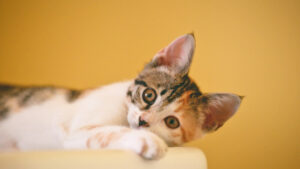
Crafting A Cat Kick Toy with Hidden Treats
There’s something uniquely satisfying about watching your cat engage with a cat kick toy, especially one that rewards their play with hidden treats. Such toys
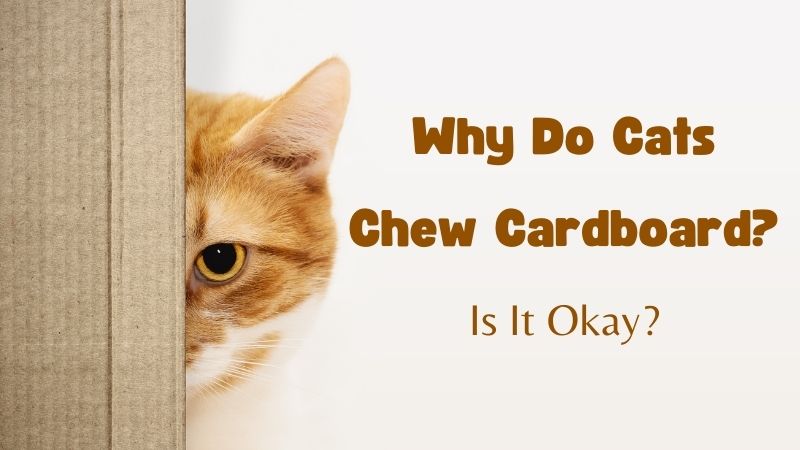
What’s this all about and why do cats chew cardboard at all? Usually, cats chew cardboard just because it’s enjoyable and feels good on their gums. Also, cats might keep chewing cardboard because they like the attention they get from you when they do it.
You might often find bits of bitten cardboard around your home. It’s not just your cat! Lots of cat owners say their cats chew on cardboard boxes or other cardboard items at home.
This article will look into why they do this and how you can stop it from happening again.
Let’s look at some typical reasons:
Cats are naturally curious and have a keen sense of smell, leading them to explore their surroundings. Chewing cardboard can be a way for cats to mimic hunting. This scratching, chewing, or licking is a natural behavior they might not have grown out of since being kittens.
Cats are born hunters and often inspect new things in their space by biting, clawing, and scratching before moving on.
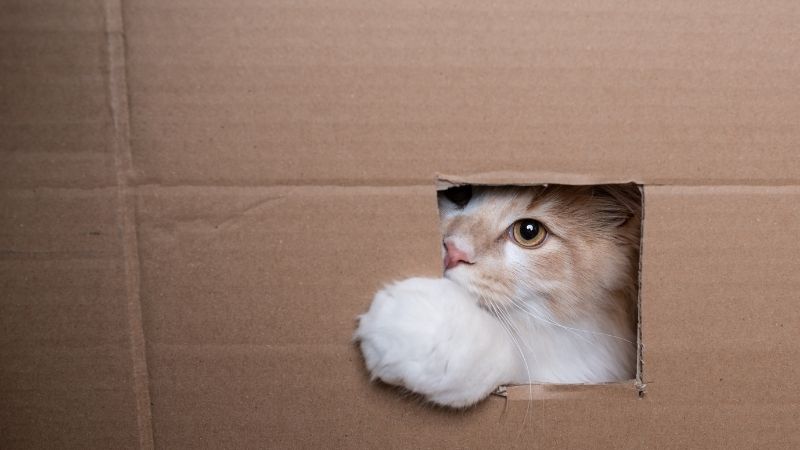
Cats need their teeth for eating and drinking, so chewing on cardboard might feel nice for them. Kittens grow baby teeth just like humans, but they develop quicker! Chewing cardboard can be comforting for a cat with growing adult teeth.
Sometimes, cats chew non-food items if they have thyroid problems, leading to sore gums. If you’re worried, it’s best to talk to a vet.
Cats chew cardboard partly to mark their territory. They have a special way of claiming their space by rubbing against things and people. This is called “marking.” cats may chew or bite things they consider theirs, like furniture or cardboard.
Your cat might not be very fond of cardboard, but they might use it to mark their territory. They might not always chew it, but they could rub their face on it when you’re around.
It’s usually okay to let your cat play with cardboard, but if you don’t want old boxes around, think about getting a cat-friendly cardboard cat house. These are safe, non-toxic, and look much better than random cardboard.
Cats are mysterious, and we don’t always know what they’re thinking. Your cat might not really care about the cardboard, but they can still have a good time with it. They probably like the feel of their paws on paper and the sound it makes. But watch out: Your cat could make a big mess.
If your cat is anxious or stressed, they might start to do things like bite furniture or rip up paper. This might seem out of the blue, but it’s often because of something in their environment.
Cats are naturally curious and like to play, so they’ll find ways to amuse themselves if they’re bored. If your cat seems bored or unhappy, you might want to mix up their routine by getting new toys.
Our cat kicker toy is great for keeping your cat busy for hours. Just put it on the ground, and then watch them play!
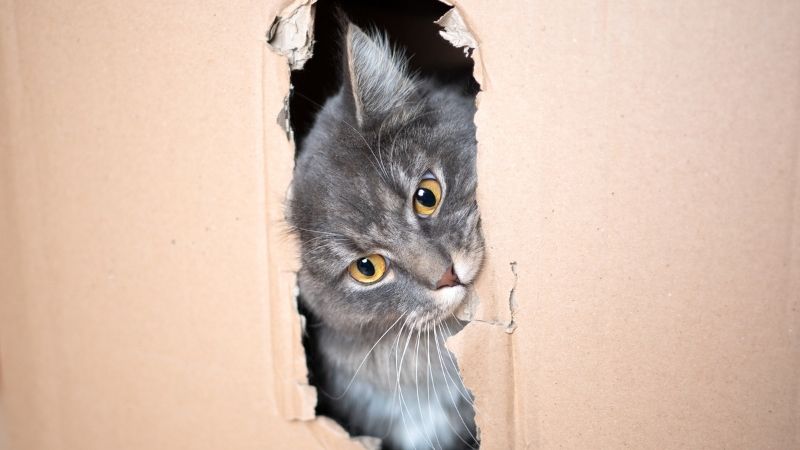
It’s generally okay for your cat to chew on cardboard, and many cats exhibit this behavior.
However, while chewing on cardboard is generally not harmful, but a few important things should be considered.
Cats enjoy playing with cardboard, but eating it is a different story. Giving your cat small pieces of cardboard to play with is usually fine, but if they start eating it, that’s a concern. Eating too much cardboard could upset their stomach and might indicate a condition called pica. Keep an eye on your cat’s cardboard habits.
Be aware of the chemicals in the cardboard your cat plays with. Some are treated to be water-resistant or stronger, but these can be harmful if your cat eats them.
Even if the cardboard is clean and untreated, it’s not good for cats to ingest. Also, avoid cardboard with sharp edges that could hurt your cat.
Ingesting large amounts of cardboard can cause digestive issues or even lead to blockages, which are serious health concerns.
If you notice your cat chewing excessively on cardboard, it could indicate underlying health issues, such as dental problems, nutritional deficiencies, or gastrointestinal issues, and it’s recommended to take them to the vet for a check-up
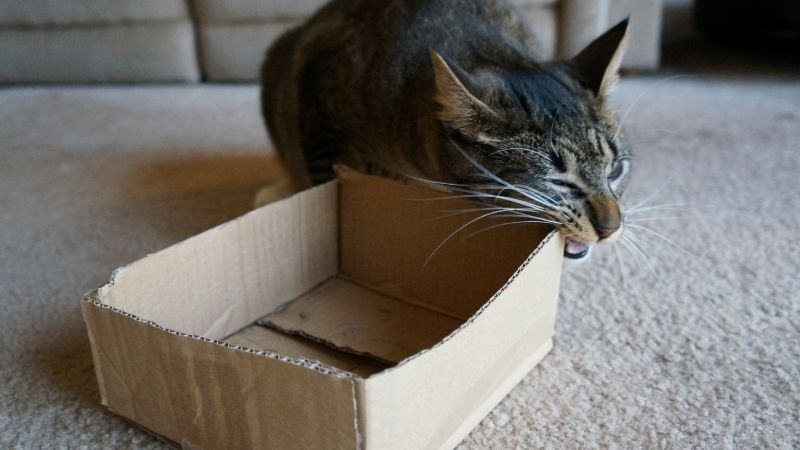
Preventing your cat from chewing cardboard involves a few tips:
Offer your cat safe chew toys. These can divert their attention from cardboard and satisfy their chewing instinct. Look for cat toys that are designed for chewing and are safe if nibbled on.
Engage your cat in more interactive play sessions. Cats often chew on cardboard out of boredom, so keeping them active and entertained can reduce their interest in cardboard.
Keep cardboard out of your cat’s reach. If they can’t access it, they can’t chew it. Break down and store cardboard boxes away immediately after use.
Apply safe deterrents to cardboard. Some cat owners use natural, cat-safe sprays with scents that cats dislike, such as citrus or menthol, on cardboard to discourage chewing.
Sometimes, chewing on non-food items like cardboard can indicate health issues such as dental problems or nutritional deficiencies. Regular veterinary check-ups can help rule out any underlying health concerns.
Ensure your cat has a stimulating environment with plenty of opportunities for play, exploration, and relaxation. This can include cat trees, window perches, and puzzle feeders.
If your cat is chewing cardboard due to stress or anxiety, identifying and addressing the cause of the stress is important. This might involve making changes to their environment or routine to make them feel more secure.
If you catch your cat chewing on cardboard, redirect them gently to an appropriate activity or toy. Consistent training can help them understand that cardboard is not an acceptable item to chew on.
You can follow these 8 tips to redirect your cat’s attention from the cardboard and ensure that they’re away from chewing cardboard.
If you’ve noticed your cat biting cardboard, it’s time to figure out why. Whether your cat is stressed or just wants a different toy, there are several ways to stop this.
If your cat shows signs that they’re chewing cardboard for a specific reason, it’s a good idea to check with your vet.
If you found this article useful, you might also be interested in – Why Is My Cat Meowing A Lot? 6 Reasons.


There’s something uniquely satisfying about watching your cat engage with a cat kick toy, especially one that rewards their play with hidden treats. Such toys

Cats and their fascination with toys, particularly the infamous cat kick toy, have always left us in awe. But have you ever wondered what makes

When your feline friend interacts with a cat kick toy, it’s not just playtime; it’s an adventure. Selecting the ideal toy between a cat kick

Are you on the hunt for the ideal playtime companion for your feline friend? Look no further! In this comprehensive comparison, we dive into the
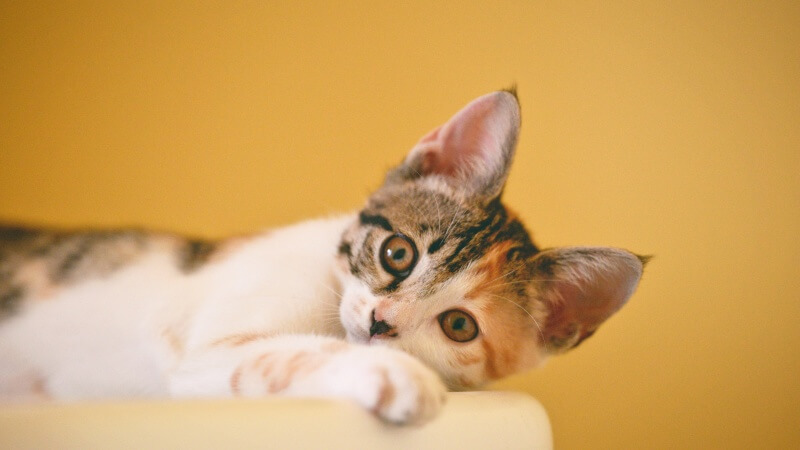
There’s something uniquely satisfying about watching your cat engage with a cat kick toy, especially one that rewards their play with hidden treats. Such toys

Cats and their fascination with toys, particularly the infamous cat kick toy, have always left us in awe. But have you ever wondered what makes

When your feline friend interacts with a cat kick toy, it’s not just playtime; it’s an adventure. Selecting the ideal toy between a cat kick

Are you on the hunt for the ideal playtime companion for your feline friend? Look no further! In this comprehensive comparison, we dive into the
Copyright © 2024 catkickertoyshop. All Rights Reserved.